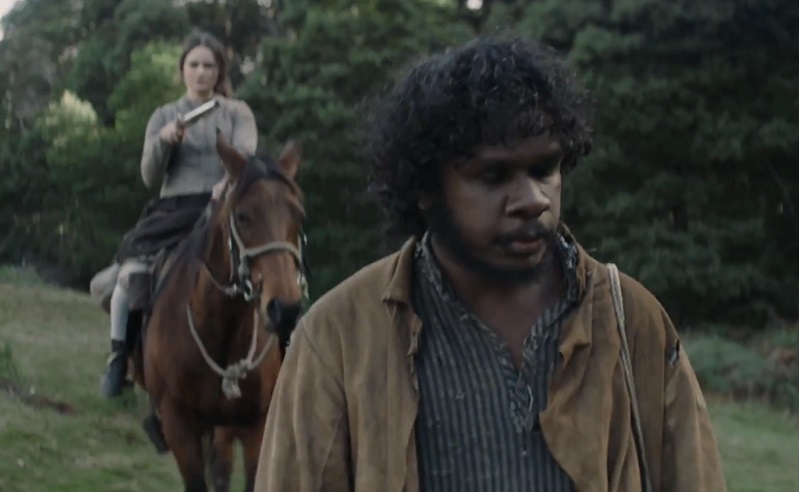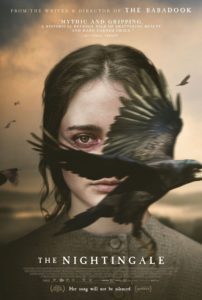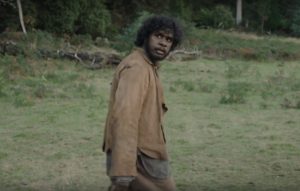The Nightingale | Jennifer Kent's film review (Venice 75)
11/09/2018 film review by
The Australian director returns to the scene with an imperfect meditation on hatred and diversity disguised as a nineteenth-century rape & revenge, revisiting the brutality of the colonial period and grasping its current relevance

After the announcement that it would be presented at the 75th Venice Film Festival, a certain curiosity was immediately created around The Nightingale , not so much because it was later discovered that it would be the only film in competition directed by a woman (l 'Australian Jennifer Kent , leapt to the honors of the horror fandom in 2014 for Babadook ), rather because, as almost always happens with festival previews, neither a trailer nor a precise plot from which the genre could be easily deduced had been circulated belonging to the film. Well, on balance it can be ascribed to the trend of turnip & revenge in costume with a strong political subtext.
 21-year-old Irish convict Clare ( Aisling Franciosi ) is serving her seven-year sentence in the remote wilderness of 1825 Tasmania under the lewd gaze of brutal Lieutenant Hawkins ( Sam Claflin ) and his British soldiers. With her beautiful voice the girl had to entertain the drunken men for many nights during their revelry, earning her the nickname "Nightingale". However, Hawkins is not interested in freeing Clare – who by the way is the mother of a newborn baby – and continues to abuse her and harass her husband Aidan (Michael Sheasby ). After a confrontation that results in an escalation of aberrations against the two prisoners by Hawkins and two of his subordinates (including the narrow-minded Sgt. Ruse ofDamon Herriman ), the latter hastily leave the village and head north, convinced that there will get the coveted promotion.
21-year-old Irish convict Clare ( Aisling Franciosi ) is serving her seven-year sentence in the remote wilderness of 1825 Tasmania under the lewd gaze of brutal Lieutenant Hawkins ( Sam Claflin ) and his British soldiers. With her beautiful voice the girl had to entertain the drunken men for many nights during their revelry, earning her the nickname "Nightingale". However, Hawkins is not interested in freeing Clare – who by the way is the mother of a newborn baby – and continues to abuse her and harass her husband Aidan (Michael Sheasby ). After a confrontation that results in an escalation of aberrations against the two prisoners by Hawkins and two of his subordinates (including the narrow-minded Sgt. Ruse ofDamon Herriman ), the latter hastily leave the village and head north, convinced that there will get the coveted promotion.
Clare, survived by a miracle but tried both physically and mentally, then decides to take the dark path of revenge, throwing herself in pursuit of the tormentors. To follow their trail, however, he must rely on the reluctant native Billy ( Baykali Ganambarr ), an aboriginal who can do nothing but stand by to watch his people killed and his lands desecrated by the colonialists and who is therefore not exactly happy to work with a light-skinned person. Clare, for her part, is also prejudiced against the natives. However, along the way they will have to find ways to put aside their differences and work together.
The enormously important premise to be made with The Nightingale (more than with other films) is that the laudable intentions , which certainly transpire clearly, to tell a story of violence and its consequences from a female perspective by retracing the troubled and violent history of the colonization of 'Australia, an evident paradigm of modern times (which apparently hasn't shown significant improvements since then), trying to make people understand how the answer - a bit like what happens in 22 July by Paul Greengrass ( our review ) - is to be found in the empathy towards others, collide with a technically erratic realization and with a wavering writing that could leave the viewer dumbfounded.
And many will perhaps be displaced by the not always functional juxtaposition of very different registers. If the rape sequence that kicks off the story is almost unbearable in its 7′ duration, the film – which was awarded the Special Jury Prize amid controversy (perhaps as 'compensation' for the insults directed at the end of the screening press to the director ) – certainly cannot be compared to classics of the genre such as The Last House on the Left or Do not rape Jennifer . The reason must be sought not only in the lines written above, but also in the multidimensionality of Clare and Billy, whose destiny is far greater and more symbolic than that of the usual protagonists of the vein (see in this sense the very recent Revenge by Coralie Fargeat ). As already done with Babadook , a film that dressed up in horror to talk about the relationship between mother and son, The Nightingale offers a meditation on hatred and fear of the different hidden under the guise of a predictable revenge in a western sauce.
 Jennifer Kent decides to show how Irish and Aboriginal people were in all respects considered inferior and expendable by the British without the slightest remorse in the Australian society of the early 19th century, founded on racial injustice and inequality. Thanks to this context, revenge takes on a different, more complex flavour . The Nightingale then finds in the two main actors, the Italian-Irish Aisling Franciosi (who speaks with a funny Milanese cadence live) and the debutant Baykali Ganambarr (who won the Marcello Mastroianni Award), an atypical pair of outcasts who love sing songs in their native languages that works(despite some inopportune too 'nice' moments) from the difficult beginnings to the final complicity, for what in phono is a classic coming-of-age story that will lead them to mature together.
Jennifer Kent decides to show how Irish and Aboriginal people were in all respects considered inferior and expendable by the British without the slightest remorse in the Australian society of the early 19th century, founded on racial injustice and inequality. Thanks to this context, revenge takes on a different, more complex flavour . The Nightingale then finds in the two main actors, the Italian-Irish Aisling Franciosi (who speaks with a funny Milanese cadence live) and the debutant Baykali Ganambarr (who won the Marcello Mastroianni Award), an atypical pair of outcasts who love sing songs in their native languages that works(despite some inopportune too 'nice' moments) from the difficult beginnings to the final complicity, for what in phono is a classic coming-of-age story that will lead them to mature together.
Instead, in front of them is Sam Claflin, one of the most repugnant villains to appear on the big screen in recent memory , capable of the most abject actions without batting an eyelid and made absolutely as credible as he is detestable by the director. If we can dispute a half misstep, although Jennifer Kent voices the sad story of Aboriginal tribulations, Billy ends up embodying the cliché of the black person who helps the (white) protagonist with self-proclaimed special abilities, often of a spiritual nature (one stereotype that is indeed deconstructed, given that the boy's ceremonies are never of any use, but which can only appear as such anyway).
Shot in an unusual 4:3 aspect ratio , The Nightingale is told through naturalistic and simple images, intended however as a warning. The terrible acts of which human beings are capable of committing themselves are due to the fear of everything that is different and this awareness makes the feature film timeless and pertinent. Thus, when in the last minutes Jennifer Kent shows again the beauty of this devastated country, the viewer is hit by a bittersweet note on which she will have to continue to reflect.
Waiting to know when – and if – it will be distributed in our parts, below you will find the trailer of The Nightingale:
© Reproduction reserved
No comments:
Post a Comment